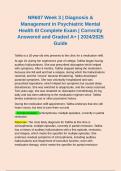NR607 Week 3 | Diagnosis &
Management in Psychiatric Mental
Health III Complete Exam | Correctly
Answered and Graded A+ | 2024/2025
Guide
Talitha is a 26-year-old who presents to the clinic for a medication refill.
At age 19, during her sophomore year of college, Talitha began having
auditory hallucinations. She was prescribed olanzapine which helped
with symptoms. After 6 months, Talitha stopped taking the medication
because she felt well and had a relapse, during which the hallucinations
returned, and the "voices" became threatening. Talitha developed
paranoid symptoms. She was voluntarily hospitalized and was
prescribed risperidone, which helped her symptoms but caused sleep
disturbances. She was switched to aripiprazole, and the voices returned.
Two years ago, she was restarted on olanzapine monotherapy 15 mg
daily and has been adhering to the medication regimen since. Talitha
denies substance use or other psychiatric history.
During the medication refill appointment, Talitha endorses that she still
hears voices, but tries to tune them out and
- Correct Answer - schizophrenia; multiple episodes, currently in partial
remission
Rationale: The most likely diagnosis for Talitha at this time is
schizophrenia; multiple episodes, currently in partial remission. Talitha
has a history of auditory hallucinations with a first episode, remission,
and relapse, which meets the specifier for multiple episodes. She
endorses residual symptoms of schizophrenia, including auditory
hallucinations and impairment of executive function, even with
medication therapy, which meets the specifier for partial remission
,Which of the following is the most appropriate pharmacologic
management strategy for Talitha?
-continue olanzapine 10 mg daily
-increase olanzapine to 15 mg daily
-switch to clozapine 12.5 mg daily
-switch to olanzapine/samidorphan 15mg/10mg
- Correct Answer - switch to olanzapine/samidorphan 15mg/10mg
Rationale: The most appropriate pharmacologic management strategy
for Talitha is to switch to olanzapine/samidorphan 15mg/10mg.
Olanzapine may be continued with an increase in dosage; the
medication has been well-tolerated and the client has had trials of other
antipsychotic medications. Since Talitha has experienced weight gain
with olanzapine, it may be appropriate to trial olanzapine/samidorphan to
mitigate additional weight gain. Talitha does not have a history of opioid
use disorder and may safely begin olanzapine/samidorphan without
concerns of opioid overdose, a potentially life-threatening interaction. If
Talitha does not experience full remission with an increased dose of
olanzapine, the provider should consider clozapine for this client.
select the most appropriate ICD-10-CM code for Talitha's diagnosis.
- Correct Answer - F20.89
Rationale: F20.89 Acute exacerbation of chronic schizophrenia is
chosen to reflect the exacerbation
Which of the following is the appropriate evaluation/management (E/M)
code for this visit?
99214
99213
99215
99205
, 99204
99203
- Correct Answer - 99215
Rationale: Talitha is an established client with one chronic illness with
exacerbation, requiring a medication change; therefore, Talitha's visit
qualifies as 99215: established client with a high level of medical
decision making.
Eric is a 37-year-old who presents to the clinic with new symptoms.
Past psychiatric history: Eric was diagnosed with schizophrenia at age
22. At that time, he had symptoms of paranoia, auditory hallucinations,
avolition, and social withdrawal. He was prescribed aripiprazole 10 mg
with good results. Over the past 15 years, his dose has been titrated up
to 15 mg daily with mild, tolerable adverse effects. Eric has no history of
relapse of symptoms before this point. Eric denies substance use or
other psychiatric history.
During the appointment, Eric endorses his symptoms have returned. He
has begun having auditory hallucinations, and he worries that everyone
around him is "out to get him." Upon further inquiry, Eric states that his
dad, with whom he lived, died six months ago and Eric no longer has
reliable housing. He tries to remember to take his medications daily, but
states "I don't always have them with me.”
- Correct Answer - schizophrenia; multiple episodes, currently in acute
episode
Rationale: The most likely diagnosis for Eric is schizophrenia; multiple
episodes, currently in acute episode. Eric has had a history of auditory
hallucinations which resolved. At this time the hallucinations have
returned, this is a second acute episode.
Which of the following is the most appropriate pharmacologic
management strategy for Eric?




